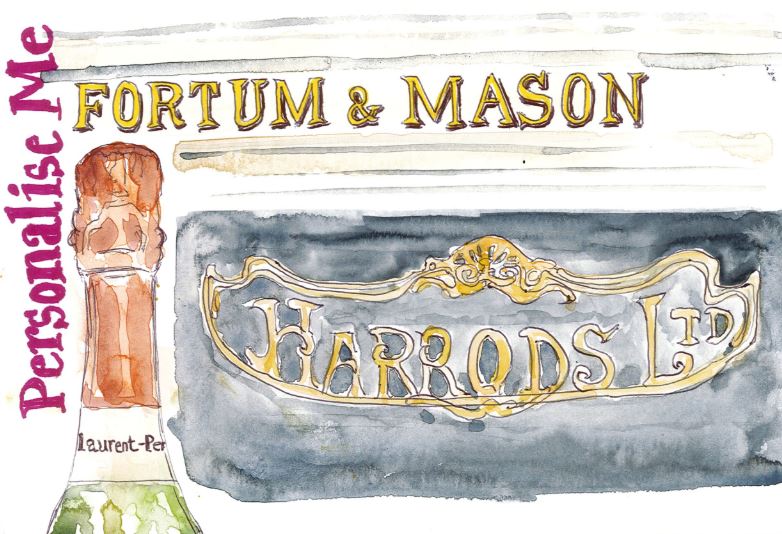Two managing directors and one Chief Executive Officer (CEO) gave presentations at Regents University London in Spring 2024. In their presentations they addressed issues about challenges they face in their jobs. In particular, they focused on challenges in maintaining and improving the success of their respective luxury brand businesses (Athron, 2024; Guy, 2024; and Ward, 2024 and see Figure 1).
Figure 1 Three Traditional Luxury Brands

The issue that particularly interested me was the importance of being creative with traditional brands in a rapidly changing technological world. Michael Ward, Managing Director of Harrods, said that luxury was:
“…created by making couture commercial.” (Ward, 2024)
He said that creation itself is not enough and for a luxury business to be successful it must combine what the business has to offer on the creative side with a business data perspective. Therefore, he argued, a business such as Harrods needs to have a ‘drive on creativity that is based on data’ and hence the need to use both the right side of the brain {the creative side} and the left side of the brain {the data side} (Ward, 2024).
For Harrods this has meant improving the experience of customers to satisfy their inquiring minds (e.g. so that they can design exquisite perfumes themselves); constantly pushing the boundaries (e.g. in marketing entertainment); and making ‘ordinary’ offerings (e.g. fish and chips) extraordinary (the best fish and chips in the world with Tom Kerridge). Also, Michael said this approach involved knowing your customers in a more profound way than your competitors (e.g. using Artificial Intelligence, AI) to cater for them with special all-round experiences (Ward, 2024). Ward (2024) said:
“I cannot overestimate the understanding and data from AI that is key and unique. You then have to build something exceptional that wows the customer.”
To do this Ward argued that “creativity is key” because it defines the point of difference. Also, he said, to be creative you need to “immerse” yourself in art and travel to other countries and “be unbelievably curious in relevant and irrelevant stuff” (Ward, 2024).
For Laurent-Perrier, it’s growth story depended on securing the supply of champagne from the vineyards in France. This is what Bernard de Nonancourt did after he took over the family business in 1948 (Guy, 2024). Bernard developed the Champagne region of France after World War II and then introduced innovations that transformed the business. For example, stainless steel barrels rather than oak barrels were used to retain a fresh brew. Also, new techniques were used with different products (e.g. for rose champagne, the maceration technique) (Guy, 2024). Between 2014 to 2024 Laurent-Perrier has gone through another growth phase as a more data-driven forensic approach has been applied to the distribution of products (Guy, 2024).
Tom Athron, CEO of Fortnum and Mason, gave a presentation on the reinvention of Fortnum and Mason which opened in 1707 “when Great Britain was born” (Athron, 2024). Athron explained that when he became CEO, on 4th January 2021 during the Covid-19 pandemic, he wanted to redefine luxury. Rather than being ‘exclusive’, ‘rare’ and ‘costly’, he wanted luxury to be “as much about atmosphere … inclusive, warm, {and} friendly…” (Athron, 2024). The owners of the business, the Weston family, gave Athron the “dream brief”. They said that they wanted Tom to make the business “beautiful, sustainable, profitable” and if he did this, they would be happy (Athron, 2024). When he started the job, he focused on customers’ complaints. He identified ten things at the root cause of these complaints and then addressed them. Since then the business has focused on ensuring that it provides extraordinary food and drink experiences so that customers want to come and taste, see and smell them in Piccadilly London. Inter alia, Athron gave two pieces of advice:
“Ground your ideas in the customer {and} you can make a lot of progress quickly.”
And, in response to his Mum’s remark of
“Don’t, for God’s sake, change anything…”
he said:
“You have to change everything – the trick is to do so – by making things increasingly relevant in a changing world.” (Athron, 2024)
So, in each case, these companies are driven by people who seek the very best for their customers. They take customer data very seriously, and they creatively change their businesses in light of new technology (e.g. use AI and/or social media) whilst, at the same time retaining traditional identities and unique selling factors of their businesses. It takes a lot of thought, dedication, and hard work to do these things well.
Dr Peter Sharp 27th March 2024
References
Athron, T. (2024) The Reinvention of Fortnum and Mason, Herringham Hall, Regent’s University London, 6th March 2024, 1 pm to 2 pm.
Guy, A. (2024) How Following your Passion can Lead to a Surprising Career High, Herringham Hall, Regent’s University London, 21st February 2024, 1 pm to 2 pm.
Ward, M. (2024) Left or Right, Tuke Hall, Regent’s University London, 20th March 2024, 11 am to 12 noon.